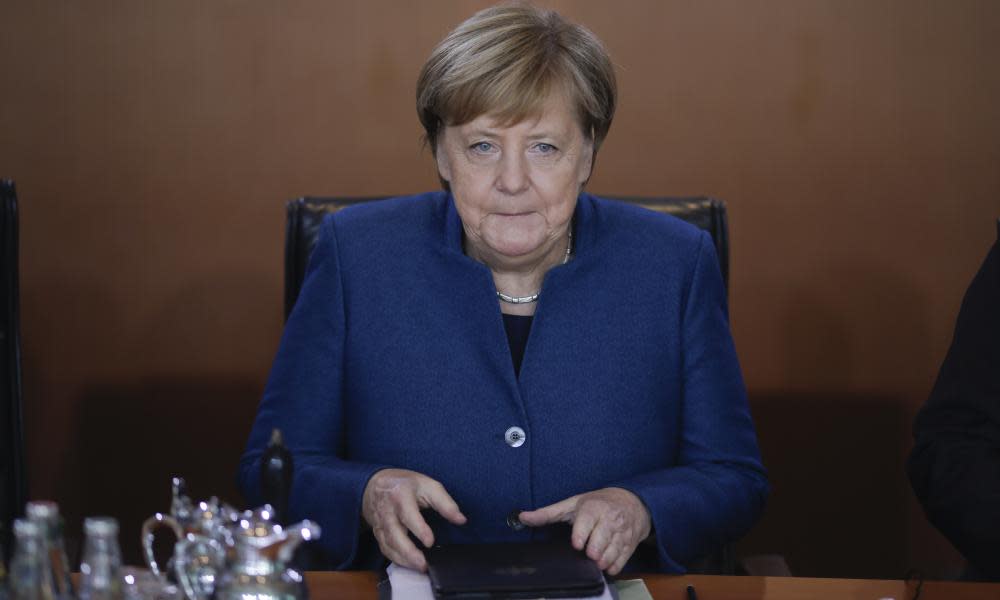Merkel: Germany is making contingency plans for no-deal Brexit

Angela Merkel has revealed Germany is making contingency plans for a no-deal Brexit.
The German chancellor said her government had started to make “suitable preparations” for the possibility of Britain and the EU failing to reach a final agreement.
“It is only fitting as a responsible and forward-thinking government leadership that we prepare for every scenario – that includes the possibility of Great Britain leaving the European Union without an agreement,” she told German parliamentarians in a special address dubbed her “big Brexit speech” by the German media, ahead of a European council meeting in Brussels on Wednesday. “In the government, we have begun to prepare ourselves appropriately for this.”
Merkel provided a list of her concerns, from citizens’ rights to customs issues, which she said – despite Michel Barnier’s reassurance that “90% of the text of the exit agreement has been completed” – remained unresolved.
“This brings with it a whole array of questions, such as: how, the day after Brexit, do we manage the estimated 100,000 British citizens who, in some cases, have been living in Germany for years? How do we deal, for example, with teachers of British citizenship, who are classed as German civil servants, and how should that continue? How do we appropriately prepare our authorities for the added burdens to do with customs issues?” she asked.
The chancellor said her government was equally concerned about the thousands of German citizens living in the UK, as well as German businesses operating there, and how they could be prevented “from facing any disadvantages”.
Merkel said the negotiations with Britain had been intensive and demonstrated goodwill on both sides, despite what she called the “unfortunate” lack of breakthrough over the Irish border question. To applause from MPs, she said she wished Britain, which had “helped shape the EU, politically, economically and culturally”, would continue to be a “close and trustworthy partner”.
But she added that it had to be clear to all sides that, once out of the EU, Britain could not expect to have the same rights as EU members. “There always needs to be, and there will be, a difference between having membership of the European Union and a partnership with the European Union as a third party,” Merkel said.
Her comments will add to fears in Downing Street, which has been banking on Berlin to sweep to the rescue at a crunch time in the negotiations. It has long been thought in Whitehall that Merkel would recognise the overriding need to avoid a no-deal scenario. But one EU diplomat said Germany “was now willing to accept” this.
Earlier, it emerged that Merkel’s fears the British economy could gain a competitive advantage through even a temporary EU-UK customs union after Brexit had become a major obstacle to progress on the Irish border issue.
The chancellor has been a major force behind the scenes in arguing such a deal cannot be nodded through in the withdrawal agreement; rather, there will need to be hard negotiations in the 21-month transition period once the UK has left the EU.
The EU and the UK have found themselves at an impasse over the Irish border. Brussels is insisting the withdrawal agreement contains an “all-weather” solution for avoiding a hard border, in which Northern Ireland alone stays in the single market and customs union.
Theresa May has said no British prime minister could accept such an outcome. The UK government is pushing for the EU’s backstop proposal to be replaced in the agreement by a temporary UK-wide customs union, insisting it cannot allow Northern Ireland to be “carved off” from the rest of the country.
Berlin believes the temporary customs arrangement with the UK would look similar to the customs deal with Turkey, and there would need to be strictures to ensure a level playing field, an EU diplomat said.
Germany is not willing to let a major economic power obtain such an agreement too easily, and is preparing to build in stringent rules on competition, state aid and alignment with EU standards.
Last week, Merkel told Germany’s major exporters’ association she wanted a deal with the UK, “but not at any price”.
Merkel told German MPs she remained hopeful a deal could still be achieved. “The chances of reaching a good and viable exit agreement on time still exists. And it’s really in the interests of us and our relationship to Great Britain, in the interests of the economy ... and, of course, in the interests of the people of our countries,” she said.

 Yahoo News
Yahoo News 
